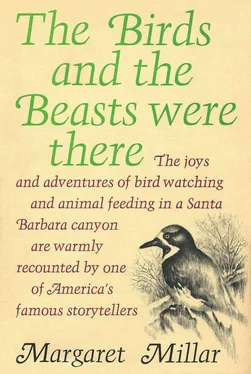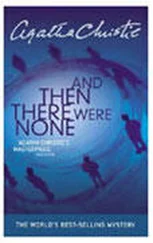Маргарет Миллар - The Birds and the Beasts Were There
Здесь есть возможность читать онлайн «Маргарет Миллар - The Birds and the Beasts Were There» весь текст электронной книги совершенно бесплатно (целиком полную версию без сокращений). В некоторых случаях можно слушать аудио, скачать через торрент в формате fb2 и присутствует краткое содержание. Город: New York, Год выпуска: 1967, Издательство: Random House, Жанр: Природа и животные, на английском языке. Описание произведения, (предисловие) а так же отзывы посетителей доступны на портале библиотеки ЛибКат.
- Название:The Birds and the Beasts Were There
- Автор:
- Издательство:Random House
- Жанр:
- Год:1967
- Город:New York
- ISBN:нет данных
- Рейтинг книги:4 / 5. Голосов: 1
-
Избранное:Добавить в избранное
- Отзывы:
-
Ваша оценка:
- 80
- 1
- 2
- 3
- 4
- 5
The Birds and the Beasts Were There: краткое содержание, описание и аннотация
Предлагаем к чтению аннотацию, описание, краткое содержание или предисловие (зависит от того, что написал сам автор книги «The Birds and the Beasts Were There»). Если вы не нашли необходимую информацию о книге — напишите в комментариях, мы постараемся отыскать её.
The Birds and the Beasts Were There — читать онлайн бесплатно полную книгу (весь текст) целиком
Ниже представлен текст книги, разбитый по страницам. Система сохранения места последней прочитанной страницы, позволяет с удобством читать онлайн бесплатно книгу «The Birds and the Beasts Were There», без необходимости каждый раз заново искать на чём Вы остановились. Поставьте закладку, и сможете в любой момент перейти на страницу, на которой закончили чтение.
Интервал:
Закладка:
I got up at five o’clock with the idea of doing some observing before the others arrived. I hadn’t yet tried to identify any shore birds. I only knew, from reading the Peterson guide, that they weren’t going to be easy.
I fed the dogs, and then, over a cup of hot tea, I wrote a note to leave for my husband:
Dear Ken:
Gone to class, will be bac k sometime this afternoon. Don’t eat the grapes in refrigerator or the doughnuts in bread box.
Leave living room drapes closed at front and open beside my chair. Go very slowly past this window or else crawl past so you won’t disturb them.
Love,
MMBirds had so quickly and easily become an integral part of my life that it simply didn’t occur to me that Ken might wonder what the class was about, why the grapes and doughnuts were out of bounds, and who “them” referred to. (He told me later he wondered a great deal when he read my message, not about grapes or doughnuts, but about marbles, whether some of mine had been lost.)
I was propping the note on his bedside table when he suddenly let out a loud groan and rolled over on his back.
“Don’t wake up,” I said. “I’m just going to school.”
“It’s the middle of the night.”
“Not to me.”
To me it was the beginning of a new day. As I backed the car out the driveway I felt curious and excited and a little nervous. It was like being eighteen again, on my way to my first class in Greek at the University of Toronto, but there was one big difference. This time I wasn’t going because it was the thing to do, or in order to please someone else or even to educate myself to earn a living. This time I was going for the most important reason of all: I wanted to learn.
There is surely nothing more discouraging to the new bird watcher than the sight of a thousand gulls on a beach at low tide. This is especially true in an area that’s frequented by a dozen different kinds of gull, nearly all of which change plumage every year for the first four years. Some also change bill and leg color every year, and still others show seasonal changes in plumage.
No matter how often I shifted position and readjusted my binoculars, the gulls on the beach that morning all looked exactly alike to me.
Fortunately for my morale, there were other birds in the slough more easily identifiable: a dozen great blue herons, some snowy and common egrets and a black-necked stilt. The herons and egrets ignored me but the stilt pegged me as an intruder and announced my presence with earsplitting cries while he flew over my head, his long black beak sticking straight out in front and his improbable long pink legs sticking straight out behind.
The new bird watcher often thinks that the birds he or she identifies at the beginning are those which are common in that particular region. The very first identification of a friend of mine was a wood duck at the local Bird Refuge. She assumed that this species was as common as some of the others that hung around the refuge — coots, ruddy ducks, mallards, cinnamon teal. Five years have passed and she’s still searching for another wood duck. My experience with the black-necked stilt wasn’t quite so extreme, but I didn’t find a second one for almost a year.
A stilt, poised in a shallow pool on his incredible legs, looks so beautiful and so gentle that one isn’t prepared for his loud, piercing shriek. Many shore birds have noisy calls — gulls and terns, godwits and willets come first to my mind — perhaps because they must make themselves heard above the constant sound of the sea and the wind. Ken and I spend much time on our beach and there are very few days in the year when the tide is low enough, the waves small enough and the wind soft enough for us to be able to converse in normal voices. At the beach, if you want to be heard, you scream. So does the stilt.
The stilt’s manner of flying is also in contrast to his voice. It is rather slow and dignified. I was watching him in flight when a car drove up and parked beside the bridge where I was standing; and a small slender man stepped out. I recognized Mr. Rett, the instructor, but he didn’t recognize me and I hardly expected him to — at least thirty people had signed up for the class the previous day, all but two of them women.
Mr. Rett, too, focused his binoculars on the stilt. Neither of us said anything. Watching the stilt together seemed the only form of communication necessary. When Mr. Rett finally spoke it was not to me in my language, but to the stilt in his: “Key up, key up, key up.”
The startled bird paused above our heads and hovered for a moment with his legs dangling like strands of pink rope frayed at the end to form a foot and knotted in the middle to simulate a knee. (The Greek word himas , meaning thong, forms the basis for his scientific name, Himantopus mexicanus .) Then, with one final cry, the stilt took off over the bridge toward the other end of the slough. It was only after he had landed out of our sight that Mr. Rett turned to me.
“Are you in my class?”
“Yes.” I told him my name.
“Margaret Millar,” he repeated, watching me carefully as though making sure he would remember what species I belonged to. “You’re early.”
“I wanted to do some extra work on shore birds.”
“Extra work?” Now he was really staring at me. “Where do you teach?”
“Why do you assume I teach anywhere?”
“Most of the class does. These field courses in natural history are set up for teachers to earn a couple of quick credits without interfering with the regular summer session. No exams are given. All you have to do to get a B in this course is to keep breathing.”
“I’d like an exam,” I said, “and the chance to work for an A.”
“You mean you signed up because you’re interested in birds ?”
“Yes, sir.”
“Well, I’ll be damned.”
It was such a shock to his nervous system that he completely forgot my name and kept referring to me for the next two weeks as Mrs. Whatchamacallit-who’s-interested-in-birds.
Few teachers have either the desire or the opportunity to live their subjects. The man who conducts classes in Shakespeare may frequently quote the bard but he doesn’t talk in iambic pentameters and wear long hair and a pointed beard. But for Mr. Rett birds were not only a livelihood, they were a life. He had been in museum work since his early teens. He was now in his sixties, a very small, spare man who bore a certain physical resemblance to a bird. He was light on his feet and his movements were quick and precise. Sometimes on very early morning field trips when he was hunched inside his sheepskin jacket he looked like a sparrow who had fluffed out his feathers to insulate himself against the cold.
In the midst of a conversation with people about birds, he would suddenly switch and start talking about people to birds. When he called them, they would answer. Hot, dry stretches of mountainside that seemed too desolate to support any kind of existence would suddenly come alive with the exuberant ringing of wrentits or the fretful duckings and mutterings of California quail, or the clear, haunting octaves of a canon wren.
Of all western bird songs, the canon wren’s must surely be the one that everyone notices and remembers, even tone-deaf nature haters. The first time I heard it was when Mr. Rett took the class on a walk through the Botanic Garden, sixty acres in the foothills above the Old Mission, planted entirely with native California trees and shrubs and flowers.
It was the last week in July. A trickle of water was still running in Mission Creek and the garden was lush and green. Mr. Rett kept pointing out birds but I was still having trouble using the binoculars and the field guide, as well as the check list Mr. Rett had given to each of us. I spent most of my time trying to focus the binoculars, looking at the check list and the index of the field guide and shouting, “Where? What tree? What kind of bird? I don’t see any—”
Читать дальшеИнтервал:
Закладка:
Похожие книги на «The Birds and the Beasts Were There»
Представляем Вашему вниманию похожие книги на «The Birds and the Beasts Were There» списком для выбора. Мы отобрали схожую по названию и смыслу литературу в надежде предоставить читателям больше вариантов отыскать новые, интересные, ещё непрочитанные произведения.
Обсуждение, отзывы о книге «The Birds and the Beasts Were There» и просто собственные мнения читателей. Оставьте ваши комментарии, напишите, что Вы думаете о произведении, его смысле или главных героях. Укажите что конкретно понравилось, а что нет, и почему Вы так считаете.



![Маргарет Миллар - Rose's Last Summer [= The Lively Corpse]](/books/384369/margaret-millar-rose-s-last-summer-the-lively-c-thumb.webp)


![Маргарет Миллар - The Iron Gates [= Taste of Fears]](/books/433837/margaret-millar-the-iron-gates-taste-of-fears-thumb.webp)





